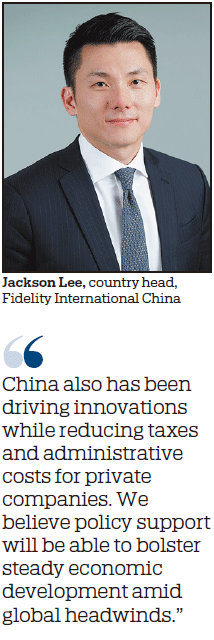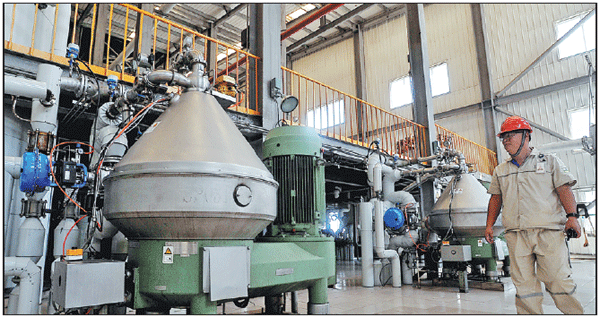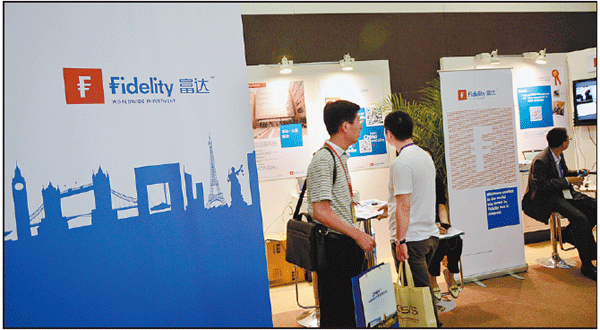Adapting to evolving consumer expectations
Reform has made economic development more dynamic, allowing companies to meet demand for a wider range of products
Editor's note: The Chinese government has adopted a series of measures to boost economic growth, including stimulating consumption, further opening up to foreign investment, supporting private enterprises and encouraging technology innovation. China Daily interviewed senior executives of well-known multinational companies to share their views on the country's economic development and their companies' business strategies in China.
Q1: China has rolled out a series of measures to stimulate consumer spending and boost economic growth. What opportunities are there for your business?
Q2: Overall Chinese economic growth has slowed, but the top-line numbers remain relatively robust. In what areas do you plan to increase investment or employment?
Q3: What business opportunities do you see as China continues to pursue higher-quality growth, which is increasingly driven by services and consumption?
Q4: What do you see as the most resilient part of the Chinese economy and how do you plan to align your business with it?
Q5: How has your company adjusted to the uncertainties brought by trade frictions between China and the United States?
Q6: China has adopted policies to further open the economy to foreign investment, to transform financial services and to promote private enterprises. How are you planning to take advantage of these policies?
Q7: How does your company plan to take advantage of the technology transformation opportunities in China over the next decade?
A1 We see opportunities in the agricultural and food sectors amid changes in consumption habits, as a result of the significant improvements in people's living standards. The Chinese consumers are increasingly concerned about food safety and quality, and China's middle-income groups are demanding a wider and more diverse range of dietary choices. China's supply-side reform over the past few years has also made economic development more dynamic and resilient, driving the steady expansion of consumption.

LDC has been focusing on providing high-quality products to customers and end consumers for almost 170 years. We see opportunities in consumers' growing demand for high-quality food, and have launched a downstream expansion strategy to more directly meet their needs.
In terms of new initiatives, our strategy to move into more value-added products is gaining strong momentum. One example is the recent launch of our new Chef Fu brand, a cooking oil for the restaurant and catering industries, which is distributed in partnership with Meituan Dianping. As a private, family-owned company, we have a philosophy of creating mutually beneficial opportunities, through partnerships like this, throughout our value chain in China.
We also see a lot of potential in the food innovation space, as we look for alternative proteins in response to dietary shifts and the impacts of climate change. China is an innovative market and, to help identify the right potential partners, we recently became a founding member of the China Food Tech Hub, launched by Bits X Bites, China's first food-focused venture capital fund.
A2 As one of the country's longest-standing foreign investors, LDC is rooted in China. We have made a long-term commitment to the Chinese market, with a supply chain, fixed asset operations and sales that cover almost every province in the country. Our activities here span the entire value chain from farm to fork, across all eight of our business platforms - grains and oilseeds, rice, freight, global markets, coffee, cotton, sugar, and juice. We have close to 1,000 employees in our 10 main business locations, including four offices and six operating fixed assets.
As a major merchant and processor of agricultural products, LDC sees opportunities in China's growing demand for high-quality food, and has launched a downstream expansion strategy accordingly, aiming to provide sustainable and traceable food. As part of that strategy, and in response to China's positive encouragement of more foreign direct investment in the country, LDC acquired a modern soybean crushing plant in Tianjin in 2018 to produce animal feed and packaged edible oils, and signed a joint venture with Guangdong HAID Group Co Ltd to expand into high-end aquatic feed. In 2019, we joined hands with Luckin Coffee, one of the fastest-growing smart retail companies in China, investing in its IPO and agreeing to build a coffee roasting plant together in Fujian province.
These investments demonstrate our long-term commitment to growing our business in the Chinese market, where we see great opportunities to move further downstream. In doing so, we will continue to seek strategic investment opportunities across our value chain, to meet the needs of Chinese customers and consumers, safely and sustainably.
At LDC, protecting the environment and supporting local communities are also at the heart of our approach to ensure sustainable business development and this is in line with the rural revitalization effort in China. Sustainable agriculture and farmer services are among the future areas of rural revitalization. As we grow with China, we are looking to match agricultural supply and demand with as little environmental impact as possible, and invest in the spaces that can help increase farmers' incomes and improve farming efficiency to support the communities we touch.
We are also committed to continuously exploring new technologies or ways to generate efficiencies and synergies, to address emerging consumer trends and shorten supply chains, as we work toward a fair and sustainable future.
A3 We see huge potential in China's robust consumption, which has been one of the main drivers of the country's economic growth. Service consumption is also expanding rapidly. Consumer needs are evolving, and we are expanding downstream to better understand their demands and enhance our supply chains to provide safe, healthy and sustainable food to Chinese consumers.
Our recent partnerships with Meituan Dianping and Luckin Coffee are good examples.
A4 China's economy has become more dynamic and resilient over the past few years, fostered by supply-side structural reform. We have seen major changes in the consumption sector with evolving patterns and steady expansion. For instance, over 400 million of China's population are in middle-income groups, seeking a broader range of dietary options and showing a growing concern for food quality and safety.
While we are investing in enhancing our business in agricultural products, like coffee, cotton or sugar, LDC also sees opportunities in moving closer to the consumer. We source sustainable products ourselves. We can ensure their traceability and we are increasingly moving to transform those products into branded food and beverages for customers and the end consumer.
A5 We have developed and maintain a globally diversified portfolio of products and a broad geographic footprint. This gives us the flexibility to adapt to market changes and uncertainties, which we have been doing for almost 170 years.
While we believe strongly in the importance of free and fair trade, we have a strong and proven capacity to rise to the challenges presented by today's global trade tensions, while managing differing trends among our business platforms.
A6 We welcome the government's policies to encourage foreign investment, and, as one of the longest-standing foreign investors in China, LDC remains committed to the Chinese market.
For example, the Chinese government's policy of encouraging foreign investment in agricultural processing enabled LDC to open its new oilseed crushing and refining operation in Tianjin in early September last year. The plant allows us to continue to respond to the growing demand for soybean meal, crude soybean oil and refined vegetable oil, from our partners and consumers in China.
We are certainly benefiting from China's offer of favorable conditions to multinational companies like LDC and this in turn enables us to envision our future development in a flourishing Chinese market with confidence, working in partnerships and seeking opportunities across the value chain.
A7 China has become a global leader in digital technology, and this technology is bringing substantial changes to production, transaction and consumption models in China's agriculture and food industries.
We embrace the benefits that technology can bring to our business, our partners and end consumers, and we are committed to spearheading the adoption of emerging technologies in China. We carried out the first full post-trade agricultural transaction using blockchain in January 2018, which was an exciting milestone.
Today, we are working with peers, including COFCO International, on developing a post-trade agricultural platform using blockchain that is open to all stakeholders. And we will continue to work with our partners in China and around the world to keep up with the rapid evolution of technology and develop and share common standards and rules of their application in the food and agriculture industries.
A4 As a foreign investor that has been participating in China's onshore market for a long time, we have been witnessing the progressive opening-up of China and the vibrant development of its capital market.

We believe the entry of foreign asset managers with global expertise like Fidelity International into the China market could potentially trigger healthy competition and support robust and sustainable development in the entire industry.
We have also seen various measures put in place by the Chinese government that aim to optimize the framework of the economy. For instance, in addition to investing in improved infrastructure, China also has been driving innovations while reducing taxes and administrative costs for private companies. We believe policy support will be able to bolster steady economic development amid global headwinds.
In addition, the ongoing trends of consumption upgrade driven by the rapid growth of a well-educated middle-income population, and continued urbanization are important factors that will drive economic growth for years to come.
China is a critical, long-term market for Fidelity International. As a world-leading asset manager and pension expert, we are keen and committed to bringing global best practices to China and enhancing the financial wellness of Chinese citizens.
A5 We have been closely monitoring the development of trade frictions between China and the US.Our long-term investment philosophy and approach remain unchanged: to find growth opportunities for our clients based on our active, bottom-up research. The private nature of our company allows us to take a long-term view, enabling us to build strong foundations for an enduring and successful business over time.
Each portfolio manager has his or her own views. I cannot name a few specific sectors, but I can tell you that Fidelity International has invested over $20 billion in Chinese companies.
A6 Thanks to China's financial opening-up, Fidelity International has already participated in China's onshore market as the first global asset manager to register with the Asset Management Association of China as a private fund management company in January 2017.
We are thrilled to see a number of new policies for the financial market opening-up, especially the 11 measures released by the office of financial stability and development committee under the State Council that aim to further accelerate the opening-up of China's financial services sector by bringing forward the removal of foreign ownership limits on mutual fund management companies to 2020.
China is a core part of Fidelity International's long-term strategy. We are excited to have a timeline for building a mutual fund business in China. We also have a long-term pension vision and strategy for the Chinese market. Retirement is in our DNA, and we believe our expertise can help support and encourage people to take responsibility for their retirement and ultimately achieve better outcomes for themselves.
A7 The speed of change has never been faster. We have been watching the development of world-changing technologies including artificial intelligence and blockchain, which could disruptively transform the future of investment. We have projects in the pipeline focusing on how to combine human and machine intelligence, and then outperform the market.
|
An employee oversees production at an LDC facility in Tianjin. Provided to China Daily |
|
Visitors walk past the stand of Fidelity International at a software and information service exhibition in Dalian, Liaoning province. Provided to China Daily |
(China Daily Global 09/25/2019 page9)




















